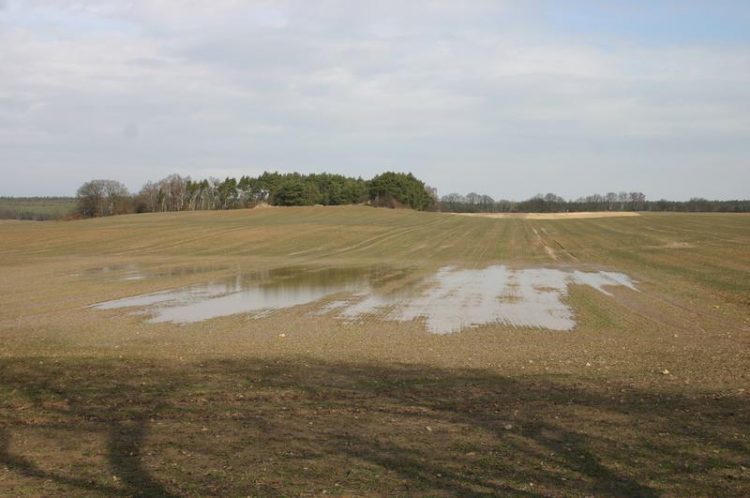Advance warning system via cell phone app: Avoiding extreme weather damage in agriculture

Winter wheat field after heavy rainfall: erosion and loss of yield due to waterlogging – the EMRA project collects reports of damage to agriculture caused by extreme weather conditions. Detlef Deumlich, ZALF
The aim of the project funded by the Federal Ministry of Food and Agriculture (BMEL) is to develop an extreme weather monitoring and risk assessment system (EMRA). As a first step, specific risks for agriculture, such as crop failures or soil erosion, are to be analysed and thus better assessed through the systematic recording of actual extreme weather events and their damage.
The main focus is on the consequences of hail, cold and late frost, waterlogging, heavy rainfall, drought and heat. In the case of waterlogging and heavy rainfall, immediate risks to the ecosystem are investigated and local management measures derived from these.
These are intended to prevent soil fertility from being endangered by erosion, for example, and to prevent adjacent ecosystems from being polluted by pesticide and fertiliser inputs. Based on two model regions and cultures, Apple in the Altes Land (Lower Saxony and Hamburg) and Winter wheat in the Uckermark (Brandenburg), a system is being developed during the three-year project in cooperation with project partners and agricultural enterprises, that provides practical decision-making aids for short to long-term extreme weather management.
“An important component here is the development of suitable communication channels”, says Dr. Detlef Deumlich, agricultural engineer at ZALF. “Therefore, in addition to an Internet platform, an app for mobile devices is also being developed to support farmers and fruit growers with their daily decisions.”
Project partners
– Julius-Kühn-Institut (JKI), Federal Research Institute for Cultivated Plants, Institute for Strategies and Technology Assessment, Kleinmachnow
– Deutscher Wetterdienst (German Weather Service – DWD), Centre for Agrometeorological Research, Braunschweig
– Leibniz Centre for Agricultural Landscape Research (ZALF), Muencheberg
Enterprises:
– DELPHI IMM GmbH, Potsdam
– proPlant Agrar- und Umweltinformatik GmbH, Münster
Subcontractors:
– Obstbauversuchsring des Alten Landes e. V. (Fruit-growing research group of the Altes Land – OVR), ESTEBURG – Fruit-Growing Centre, Jork
– State Office for Rural Development, Agriculture and Land Consolidation (LELF) Brandenburg, Plant Protection Service, FGL Risk and Control Management, Frankfurt (Oder)
Project funding:
Federal Ministry of Food and Agriculture via the Federal Office for Agriculture and Food (BLE) Project funding reference number 2815707715 in the programme “BIG DATA in agriculture” in the guideline on support of innovations in agriculture to increase ressource efficiency.
Dr. Detlef Deumlich
Research Area 1
“Landscape Functioning”
T +49 (0)33432 82-329
F +49 (0)33432 82-280
ddeumlich@zalf.de
Media Contact
More Information:
http://www.zalf.de/All latest news from the category: Agricultural and Forestry Science
Newest articles

Recovering phosphorus from sewage sludge ash
Chemical and heat treatment of sewage sludge can recover phosphorus in a process that could help address the problem of diminishing supplies of phosphorus ores. Valuable supplies of phosphorus could…

Efficient, sustainable and cost-effective hybrid energy storage system for modern power grids
EU project HyFlow: Over three years of research, the consortium of the EU project HyFlow has successfully developed a highly efficient, sustainable, and cost-effective hybrid energy storage system (HESS) that…

After 25 years, researchers uncover genetic cause of rare neurological disease
Some families call it a trial of faith. Others just call it a curse. The progressive neurological disease known as spinocerebellar ataxia 4 (SCA4) is a rare condition, but its…





















